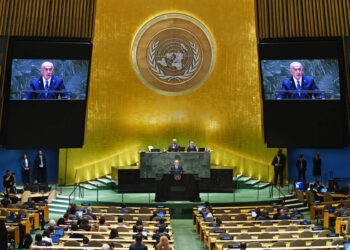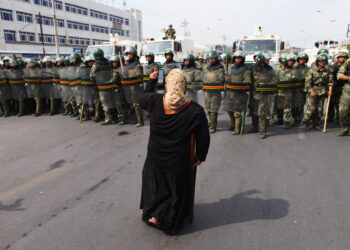Daniel Larison is a contributing editor at Antiwar.com and former senior editor at The American Conservative magazine. He has a Ph.D. in History from the University of Chicago. Follow him on Twitter @DanielLarison and at his blog, Eunomia.
President Joe Biden's expected meeting with Saudi Crown Prince Mohammed bin Salman is the culmination of more than a year of accommodating the Saudi government by selling it additional U.S. arms and refusing to criticize its past crimes and ongoing human rights abuses. While the recently reported meeting with the crown prince has now apparently been postponed until July, it seems very likely that Biden will eventually go through with it despite the intense backlash from human rights activists, Saudi dissidents and opponents of the Saudi-led coalition's war on Yemen. The president has made it clear through his administration's actions that the "recalibration" of Washington's relationship with Riyadh that was supposed to take place after Donald Trump left office will be nothing more than a return to the status quo. Biden's campaign pledge to treat Saudi Arabia as a "pariah" was always hard to believe, but the president's complete retreat from that commitment has demonstrated just how hollow his administration's human rights rhetoric is.
Biden and Secretary of State Antony Blinken repeatedly said over the past year that they would put human rights at the "center" of U.S. foreign policy. It has not been surprising that they have failed to honor this promise, but it has still been disturbing to see how little the administration has done in practice to hold client governments accountable for the abuses they have committed against their own people and for their violations of international law. From Saudi Arabia to Egypt, U.S.-backed rulers in the Middle East have been able to repress and brutalize their people with impunity for decades, and Biden's willingness to meet with one of the worst of them signals to the Saudi government—and all other client regimes—that there is nothing that they can do that would jeopardize their relationship with Washington. It is likely that friendly autocrats everywhere will interpret the meeting as a green light for more repression and killings of dissidents on the assumption that U.S. backing is unconditional. Instead of putting human rights at the center of his administration's foreign policy, Biden is pushing them far out on the periphery.
Biden's campaign pledge to treat Saudi Arabia as a "pariah" was always hard to believe, but the president's complete retreat from that commitment has demonstrated just how hollow his administration's human rights rhetoric is.
- Daniel Larison
The Biden administration has described its approach to the region as "back to basics," to quote Brett McGurk, the coordinator for the Middle East and North Africa on the National Security Council. In contrast to what he called previous administrations' maximalist aims in the region, the current administration is focused instead on "the basics of building, maintaining and strengthening our partnerships and alliances here." But what that has really meant is catering to the wishes of assorted despots, ignoring their atrocities and rushing to provide them with more weapons. The administration has doubled down on this approach even as supposed U.S. partners like MBS and Mohammed bin Zayed Al Nahyan, the UAE's new leader, try to leverage the war in Ukraine to their advantage, wringing concessions from Biden during a global crisis and even refusing to take his calls. The embrace of the status quo is largely the handiwork of McGurk, who has been working to get the administration to indulge regional client states, including Saudi Arabia and the UAE, as much as possible. As one U.S. official recently told The Huffington Post, "McGurk is the person Middle East autocrats turn to when they want a pliant ear."
If Biden thinks that a meeting with MBS will gain him anything on other issues, most of all boosting Saudi oil production in the hope of bringing down gas prices, he is going to be disappointed. As political scientist Dalia Dassa Kaye observed recently in Foreign Affairs, "If he follows through on his plans to visit Riyadh, Biden will be making a bad deal: exchanging near-certain reputational damage for the mere possibility of modest triumphs." The reality is that the Saudi government doesn't have much of value to offer to the U.S., and it has become an increasing liability and embarrassment rather than a useful partner. Biden's meeting has been sold as the triumph of realpolitik, but one looks in vain for how a presidential visit to Riyadh would advance U.S. interests. Far more than a "recalibration," the relationship needs a radical overhaul.
The Saudi government and its many boosters in Washington want our political leaders to believe that the U.S. needs Saudi Arabia more than their government needs U.S. support, and it's simply not true.
- Daniel Larison
The bigger problem with a presidential visit to Saudi Arabia is that it reinforces the belief that the U.S. must go out of its way to placate its reckless clients rather than using the considerable leverage it has with them to obtain their cooperation. The Saudi government and its many boosters in Washington want our political leaders to believe that the U.S. needs Saudi Arabia more than their government needs U.S. support, and it's simply not true. As long as American leaders think that they have to make additional concessions to maintain this relationship, they are inviting the Saudi government, and others like it in the region, to extort the U.S. for whatever they can get. That promises to make the U.S.-Saudi relationship even more lopsided and toxic, and it will also further implicate the U.S. in the many new crimes and abuses of the Saudi government that will inevitably follow, on top of the existing complicity in war crimes in Yemen.
A better course of action would be to hold the Saudi government to the same standard that the U.S. uses for other authoritarian regimes that aren't in Washington's orbit: don't deploy American forces to defend them, and don't sell them U.S.-made weapons. We know the abuses that U.S. support has enabled for decades in the Middle East, and there is no excuse to continue with business as usual. It is time for Americans to recognize the bankruptcy of Biden's "back to basics" approach and to demand an end to the reflexive, unconditional backing for authoritarians and war criminals that has caused so much misery and destruction.







